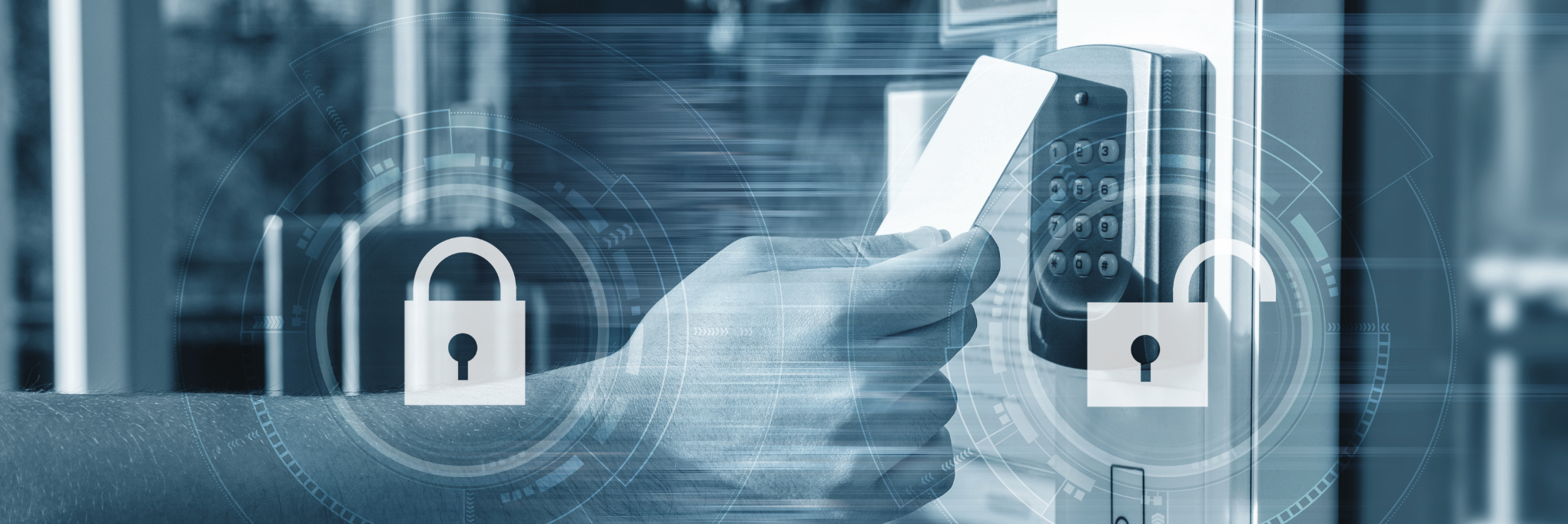

The threat of card cloning casts a long shadow in the building security landscape. As technology advances, so do malicious actors’ techniques to compromise access control systems. This article delves into the pervasive card cloning issue, explores the industry landscape, and sheds light on how Grosvenor Technology can work with your organisation to upgrade your building security approach.
Card cloning remains a substantial security risk, with hackers exploiting vulnerabilities in existing proximity ID-based readers. The shift from 125 kHz prox technologies to smart 13.56 MHz credentials marked an industry response to documented security vulnerabilities. However, even these technologies face challenges as hackers swiftly find ways to clone prox credentials.
Additionally, employee access card copying presents a significant threat vector. Attackers can obtain access card information through various avenues, such as social media, observing employees in common areas, or within the company premises.
The repercussions of cloned access control cards are severe, ranging from security breaches to potential harm to the building, company, staff, or data. A security breach could lead to reputational damage and financial losses. Recognising these dangers, organisations are urged to prioritise security measures promptly.
At Grosvenor Technology, we work with the newest systems that incorporate high-frequency communication with strong MIFARE DESFire EV2 and EV3 levels of encryption. Here is a summary of the technologies and how they can bolster building security and reduce the chances of card cloning:
MIFARE DESFire EV2: Offering advanced encryption algorithms and mutual authentication protocols, EV2 chipsets provide a formidable defence against cloning and unauthorised access attempts. With support for multi-application capabilities, EV2 cards enable access control systems to accommodate diverse credentials and functionalities within a single card, ensuring enhanced data integrity and confidentiality.
MIFARE DESFire EV3: Building upon the foundation of EV2, MIFARE DESFire EV3 chipsets introduce additional security layers to fortify access control systems further. Incorporating diversified keys and secure messaging protocols, EV3 chipsets thwart sophisticated hacking attempts and prioritise compatibility and interoperability, facilitating seamless integration with existing infrastructure. With enhanced speed and efficiency, EV3 cards streamline authentication and data transfer processes, empowering organisations to maintain a robust security posture in the face of evolving threats.
In response to the security vulnerabilities associated with traditional proximity ID-based readers, the industry is witnessing a significant trend towards mobile Bluetooth-based access control solutions. The adoption of smartphones for access control credentials has become a game-changer, offering higher encrypted credentials tied to the smartphone.
Bluetooth is seamlessly integrated with smartphones that users already utilise for various tasks. Bluetooth’s familiarity and widespread application make it an attractive choice, eliminating the hassle of remembering keys or carrying proximity cards. The encrypted nature of Bluetooth credentials provides a robust defence against cloning and hacking concerns associated with traditional proxy credentials.
Adopting Bluetooth Low Energy (BLE) in mobile access control systems ensures efficient and high-performance technology. BLE-based access control systems leverage a Bluetooth-enabled reader wired to the access control panel and the credential holder’s smartphone. This deployment is user-friendly, with a one-time internet connection required during the initial setup, making it a secure and convenient option.
Selecting the right BLE reader is crucial for effective access control. Features such as easy credential distribution, customisation options, and support for BLE and traditional cards and fobs enhance security and flexibility. BLE readers that allow customisation through a smartphone’s built-in fingerprint scanner/face unlock contribute to an additional layer of protection.
The rise of card cloning poses significant dangers to organisations, ranging from security breaches to reputational damage. Recognising the urgency to fortify access control cards against cloning, Grosvenor Technology offers these practical tips to enhance security measures.
Use modern, secure cards: Shift from outdated MIFARE Classic cards to more secure options like MIFARE DESFire, equipped with EV2 and EV3 chipsets.
Leverage security features: Make optimal use of security features available in different access control cards, focusing on secure cryptography and automatic activation of security features.
Use programmed cards: Programming cards add information, such as credential data, to the card’s chip, enhancing card security.
Embrace mobile access control: Move away from traditional cards and adopt mobile access control, utilising smartphones for secure and encrypted credentials.
Employee education: Fostering a culture of security awareness and implementing proactive measures are essential to combating the threat of employee access card copying. By addressing vulnerabilities, organisations can bolster their defences against unauthorised access and protect the integrity of their access control systems.
Regular inspections: Regular access card checks serve to identify anomalies or unauthorised replicas, acting as a deterrent to potential attackers while reinforcing the significance of access card security among employees.
Adopting advanced access control technologies becomes paramount in the face of evolving security threats. Grosvenor Technology’s commitment to innovation aligns with industry trends, ensuring that access control systems remain resilient against the growing menace of card cloning. As organisations navigate the complex landscape of security, the shift towards mobile Bluetooth-based solutions emerges as a beacon of enhanced security and convenience.
Grosvenor Technology offers tailored solutions for organisations seeking to fortify their access control systems and stay ahead of emerging threats. Speak to our experts today to safeguard your premises against card cloning.